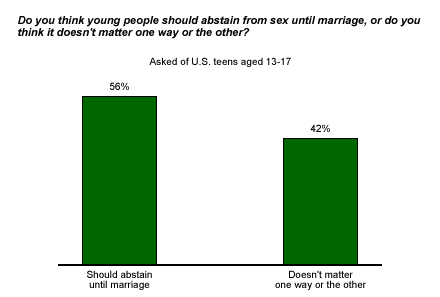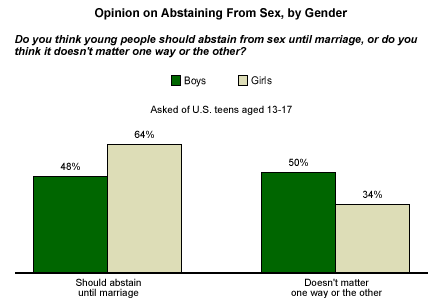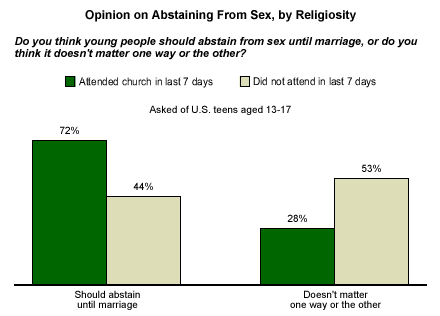Not all teens fit the sex-crazed stereotype -- in fact, a majority of them don't. Raging hormones and stereotypes notwithstanding, 56% of all teens (aged 13 to 17) in a recent Gallup Youth Survey* say young people should abstain from sex until they are married.

There's strong evidence that teens are putting thoughts about abstinence into action -- or inaction. Sexual activity among high school students has been declining for the last 13 years, according to U.S. Centers for Disease Control and Prevention. In 1991, 54% of teens reported having had sexual intercourse; that figure had fallen to 47% in 2003. Furthermore, the teen birth rate has plunged to an all-time low during the same period. Among girls aged 15 to 17, the birth rate fell 38% between 1990 and 2002.
There are several possible reasons for a precipitous decline in teen sexual activity, and many are likely tied to the messages teens are getting at home, at school, or elsewhere. In a 2001 Gallup Youth Survey, 90% of teens said that they'd talked about AIDS at school, 81% reported discussing sexually transmitted diseases, 85% had discussed pregnancy, and 77% had discussed abstinence until marriage. So, the decline could stem from teens' awareness of AIDS, STDs, pregnancy, and abstinence.
Elizabeth Walters, a clinician and health educator at HiTops, a teen sexual health center in suburban New Jersey says that it could be teens' definition of sex that has changed. "Oral sex has become a popular way to postpone intercourse. Teens don't think of it as 'having sex.' Also, there's less pregnancy because teens are better informed, better at contraception -- especially with morning-after, emergency-type contraception."
Differences of Opinion?
Sentiment about premarital sex does differ slightly between girls and boys. Just under half of boys (48%) say that young people should refrain from sex until after they are married, compared with 64% of girls.

Nevertheless, sexual activity has actually declined more among boys than girls since 1991, according to the CDC. Fifty-seven percent of boys in 1991 said they had engaged in sexual intercourse. That figure dropped nine percentage points to 48% in 2003. Sexual activity for girls fell slightly during the same period -- from 51% to 45%.
Naturally, there is a strong moral component to opinions about premarital sex. Religiosity, as measured by church attendance, is a solid predictor of views about sexual activity. In the current survey, almost three-quarters (72%) of teens who had attended church or synagogue in the last week say young people should abstain from sex until they are married, versus 44% of those who had not attended.

Bottom Line
Again, this all sounds like good news for parents who are concerned that their teens will become sexually active. But someone who is up close and personal with teens' sexual mores may have a more skeptical view of teens' opinions about sex before marriage. "Abstinence education is certainly the reason for the decline in sexual activity," says Walters. "I have no doubt about it. Teens know the goal of abstinence education is postponing sex until marriage -- and they know it's the right thing to say [in response to a survey]. But whether or not they can live up to that ideal [until marriage] is another matter."
The drumbeat for abstinence education has been getting louder. Federal funding for abstinence-only programs has increased dramatically in recent years; $170 million has been targeted for these types of sex education programs in 2005, twice as much as was spent in 2001. However, these programs have been criticized as much as they have been lauded. Existing data from studies on the effectiveness of the education approach are inconclusive, and a national evaluation of abstinence-only programs won't be released until 2006.
*The Gallup Youth Survey is conducted via an Internet methodology provided by Knowledge Networks, using an online research panel that is designed to be representative of the entire U.S. population. The current questionnaire was completed by 439 respondents, aged 13 to 17, Aug. 8-19, 2004. For results based on the total sample, one can say with 95% confidence that the maximum margin of sampling error is ±5 percentage points.